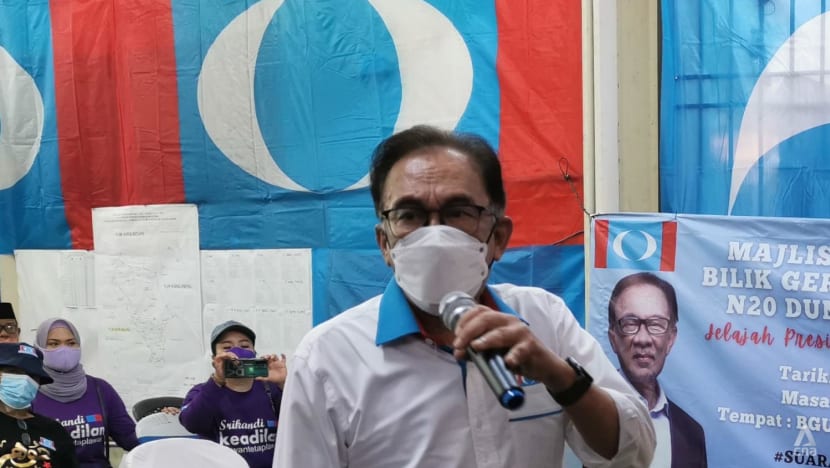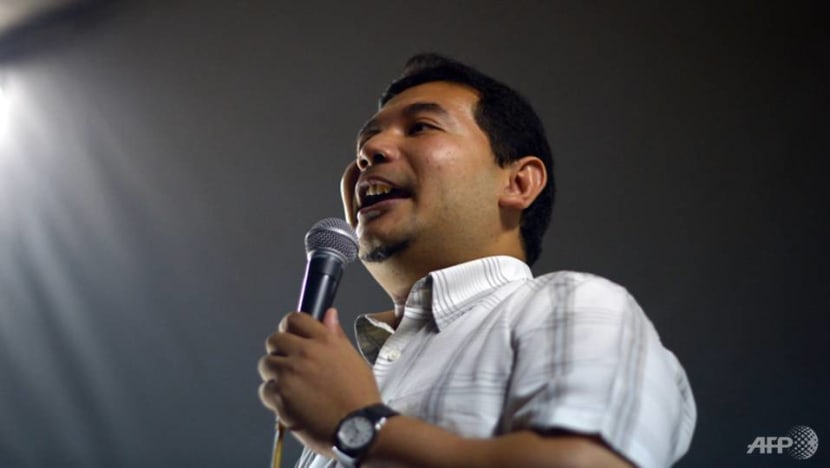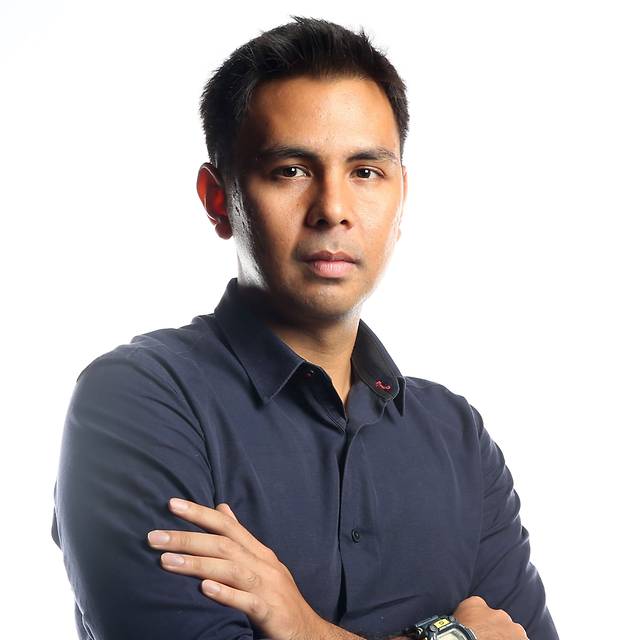Cooperation among opposition parties to be explored without compromising principles: Anwar
PKR is willing to work alongside opposition partners with same basic principles for GE15, said party chief Anwar Ibrahim.

Pakatan Harapan chairman Anwar Ibrahim speaking at a campaign rally in Senggarang on Mar 3, 2022. (Photo: CNA/ Amir Yusof)
SHAH ALAM, Selangor: Parti Keadilan Rakyat (PKR) president Anwar Ibrahim has outlined that the party is willing to explore cooperation with opposition parties for the upcoming general election in Malaysia, without compromising on principles such as good governance and anti-corruption.
Mr Anwar made the comments during a speech to officially launch the Parti Keadilan Rakyat (PKR) national congress on Saturday (Jul 16), which was held at the Ideal convention centre in Shah Alam.
“I hope my fellow PKR members understand, working together (with others) is not political expediency to win the general election. We work together based on the same agenda to bring about positive change and reject corruption,” said Mr Anwar.
He outlined that PKR was willing to work alongside its partners in the Pakatan Harapan (PH) coalition, Malaysia’s main opposition bloc. These included the Democratic Action Party (DAP), Parti Amanah Negara (Amanah) and the United Progressive Kinabalu Organisation (UPKO).
Additionally, Mr Anwar said that PH was also open to working with other opposition partners who are aligned with the same principles.
“I am the president of PKR and chairman of PH, but I’m also the leader of the opposition in the Malaysian parliament. So there must be ties and partnership with all opposition parties. I will ensure this continues based on a set agenda,” said Mr Anwar.
“There is wisdom that PH remains as the main opposition bloc. But we do not close options to build a network with those that are aligned with the same principles,” he added.
Mr Anwar explained that cooperation must be explored without compromising principles of good governance and anti-corruption.
“It’s based on these principles that we strive, as well as on these principles that we are not prepared to sacrifice in exchange for power,” said Mr Anwar.
“We have been tested, and thank God we have been steadfast and do not pawn (these principles) away,” he added.
Mr Anwar’s comments may be viewed as him digging in on his favoured “big tent” strategy – to work alongside partners in the opposition to prevent the Barisan Nasional coalition from winning the next general election.
Malaysia’s 15th General Election must be called by mid-September 2023, and there is speculation it may be called in the coming months.
However, the “big tent” strategy has attracted criticism from some quarters within PKR.
Former Member of Parliament, Rafizi Ramli who comfortably clinched the PKR deputy president post during the recent party polls, has publicly said that PH should do away with the “big tent” approach to win back Putrajaya.
He claimed that this approach led to the fall of the PH government in 2019.
“In this stormy weather, it does not matter what kind of tent you use — it would not hold and will get blown away,” he was quoted as saying by local media.

Malaysia’s political landscape has undergone drastic changes since 2018.
The last PKR polls was conducted on the heels of an election victory in the 14th General Election (GE14), when the PH coalition - in which PKR is a linchpin - defeated BN and marched into Putrajaya.
However, the PH government crumbled barely two years later following the defection of 11 PKR MPs led by Mr Mohamed Azmin Ali, who had won against Mr Rafizi in the fight for the deputy president post in the 2018 party election with a two per cent margin.
PH also suffered a string of defeats in snap state polls and by-elections since GE14.
The BN coalition, led by the United Malay National Organisation (UMNO), clinched more than two-thirds of the seats at the Melaka and Johor state polls recently.
However in his speech, Mr Anwar maintained that PH has the opportunity to win back the confidence of voters if it remains steadfast to its principles.
He highlighted that many Malaysians are embattled with various issues such as unemployment, rising cost of living and an economic crisis, under the current government led by Mr Ismail Sabri Yaakob, who is from UMNO.
Mr Anwar also acknowledged that PH and PKR have to address certain weaknesses before the national polls, and this includes bringing their political message into rural areas and the Malay heartlands.
“Yes I acknowledge this. God willing, when we meet next, the new leadership, together with other PH leaders, we will aim to correct this,” said Mr Anwar.
Mr Anwar also maintained that he would have been Malaysia's prime minister if he had acceded to requests from “corrupt leaders” to interfere in their court cases in 2021.
The Port Dickson MP told party delegates that he had a majority of MPs who backed him to become prime minister by signing statutory declarations.
In September 2020, Anwar announced that he had secured “strong, formidable and convincing” support from MPs to form a new government.
However, in his speech on Saturday, Mr Anwar revealed that he was forced to back down after he was asked to give assurances to key figures in BN and UMNO that he would discontinue their court cases.
“I said I cannot do that. I didn’t apologise and I told them, ‘Thank you, we will face each other at the next general election’,” said Mr Anwar.
“Some have said that Anwar is done. He keeps on failing (to become prime minister).
“If you want me to be successful, but I have to lick the boots of the corrupt, then choose another president,” he added, to loud applause from party delegates.
The three-day PKR congress concludes on Sunday, with both Mr Rafizi and Mr Anwar slated to give wrap-up speeches.













